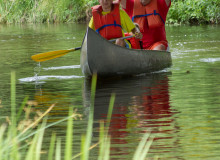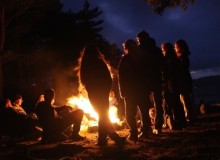
I was not a kid with long-term vision at age 13, 15 or even 17. I was concerned with having fun, getting attention, working out my rebellion. When I gave my life to Jesus at 17, everything changed. My view of the world broadened; my vision for the future expanded; my hopes for my life matured. But do kids have to wait until they are (nearly) adults to see that they can impact the world positively?
Last week in Panama, I met Jenni Davies, CEO of Christian Camping International – New Zealand, who said her organization has an emerging leaders program that starts with 13-year-olds! (CCCA members have been developing a valuable program for several years geared toward those 29 and under already involved in camping ministry.) In the New Zealand model, teens join a program that teaches them how to be leaders in school, their neighborhoods, homes and churches. And as they grow, they reach a point where they are considered “junior leaders” at age 17. Then the process continues.
Through programs like this, teenagers can become prepared for a lifetime of leadership. I can’t adequately describe how revolutionary I think this can be for some young people.
Imagine if teenagers have a desire to make a difference in others’ lives, to discover how to respond to their God-given desire to lead, what a great benefit this type of program will be to them.
Should CCCA and its member camps and conference centers try to engage with even younger leaders than we currently do? Can we give kids a vision for the positive impact they can make on their communities—and the world—if they will prepare for their future deliberately and with great care?
What are you doing to expand the vision of the young people in your sphere of influence? I’d love to hear from you.





















Sequoia Brigade Camp in California is closely associated with the Christian Service Brigade ministry in local churches. For over 70 years CSB has been developing leaders through it’s Battalion program, which places 7th – 12th grade young men into a variety of service and leadership positions. At Sequoia Brigade Camp (and all other camps throughout North America which are associated with CSB) we continue the leadership training process by having these guys as Junior Counselors. They begin at 15, and return for three years, growing in their leadership abilities. At 18, they are eligible to be Senior Counselors. The training received as a Junior Counselor at camp spills over into the local CSB program, and vice versa. The local church can be an outstanding venue for leadership development for young men, as long as their training takes place in a single-sex environment. Personally, I’ve seen nothing which does the job better than CSB.
Mr. Hunter,
I am honored as I read this article… It is so wonderful that you are encouraging adults to invest in young people and to teach them how to lead at early ages. We definitely could use more of that in our world today! I especially think about Zach when you mention leading at 15, 16, even 13 (or 12 in his case). Thank you so much for investing in his dreams — he has come so far!
What I am trying to implement is a “Penny War” at my local middle schools for LC2LC. A few years back, Penny Wars were a big thing at these schools, so I contacted the PTO and the Administration to submit my idea. Currently I am waiting for a specific reply, but it sounds like a possibility! My aim in this endeavor – besides raising money for LC2LC of course – is to show these kids that they are fully equipped to change the world in their own way. Problems like slavery are solvable, and I want them to experience the power that they possess.
Thank you for your encouragement and constant investment in us youth!
God bless you,
Jessica
Gregg,
Great post. Thanks for helping us dialogue about the future generation of leaders, particularly in a time when we are fixated on current economic issues.
The book “Do Hard Things” has encouraged us to invest many resources into these “young leaders”.
Joy El operates a year round 4.12 Leadership Training program. This past year 100 students were accepted into this program. These students participate in extensive training weekends, meet with a mentor 1 on 1 monthly, complete a monthly spiritual progress report and serve weekends throughout the year and then as part of our High School staff during the summer.
This year we will be graduating 13 students who have completed 4 or five years in the program.
We are excited that many of these students serve as our college age summer staff. Many of them often commit their lives to some type of christian ministry. I received a call from a student that I mentored 7 years ago who was excited to tell me about the ministry in which he is serving.
Thank you for helping us develop future leaders.
Aaron Ziebarth
Executive Director
Joy El Ministries
We have been operating a teen leadership program for kids ages 13-18 for the past ten years. I believe that if you raise the bar, teens will meet it and if the bar is low, they will meet that, too. Our teen design and plan our entire summer camp program which has a new theme every summer. They then are responsible for its implementation. We do canoe/kayak, equestrian, air rifle, archery, a challenge course, fine arts and drama. The adult staff are certified instructors in the various disciplines and are there to make sure safety and best practices are met. This year I would like to go deeper in our leadership trainning. Aaron, I’d be very interested in learnng what you do at Joy El Ministries.
Lisa, Phil, Scott, Veronica and Ryan:
Thanks for your comments and for sharing what’s going on in your world to raise up and train future leaders. As the father of two boys, ages 18 and 11, I’m aware that they understand what leadership is on two very different levels.
It seems to me that the greatest challenge in training the younger kids is to deliver age-appropriate and easily applicable messages about leadership principles. Otherwise, we’re giving them pie-in-the-sky theory that maybe they’ll apply some day. Young people today have to be able to see how these principles impact their lives TODAY.
I’m grateful for you and for your ministry to the next generation of leaders. God bless you all.
Gregg
Greg,
Leadership Development is an organizational priority for Grace Adventures. We have worked at the college level for a long time, with professional level, high intensity, week long, experiential leadership models. This is hands on, small group based, and an integrated learning experience. Our process is built around the concept of first understanding yourself, then building relationships with others in order to take action for the betterment of the community.
We realized this was great, but these kids were often already jaded in their leadership paradigms. We integrated the program into our High school leadership camps. Over the course of four years in the same character based model, a high school student will walk through that same leadership curriculum, as well as a biblical worldview, and pure and holy relationships. All of this is done in a two week format that in the first week trains and equips. Then the students go home, try things out, process, and experiment. When they come back they are in a service role and the processing continues. This second week of service is the glue that holds the program together. It allows a safe place for the students to try out the skills and practices they have learned, while giving them the responsibility they crave. This is Leadership Treks; it has become a staple of our camp and a dynamic program.
However we again realized we’re missing out by starting at fourteen. So now we have taken the same concepts, and in an age appropriate manner and integrated them into our youth camps. Starting at age seven you will learn about the cores of biblical world view, and begin exploring the foundations of leadership by learning about yourself and others. As you progress up to age fourteen, you’ll have encountered feed back models, teams, diversity, planning, conflict resolution, and more. All of this is blended and integrated into our summer program so as a student you would not know a difference between a leadership component and a typical bible study.
This is only our method of building leadership into youth programs. At Grace we are committed to equipping people to impact their worlds. We whole heartedly believe that we must create a surplus of leadership in the future generations. Our entire organization is dedicated to training and equipping youth, adults, families, and communities to impact their world. One life touched by God can change the world; we want to give them the tools to do so. If we train up this generation to reach out, train, and equip others, we will create a ripple effect that could reach across the globe.
I think this is a GREAT idea! I would have loved to have been involved in a leadership program when I was that age. I was saved at 7 years old, and I was always involved in some form of ministry.
The skills and lessons I could have learned at that impressionable age, would have been incredible.
We hire 14 year old part time staff and I think it would be great if we could teach them leadership skills and prepare for future ministry endeavors. I know that our kids are looking for ways to be part of the “bigger picture” of our ministry and they always want validation for their efforts. What a great idea…
Gregg I think many CCCA members across the 50 states are doing what you just explained. At New Life Ranch we run a leadership program for our 10th – 12th grade campers that is just exploding, along with a program for college graduates. Check it out on our website at http://www.newliferanch.com under Leadership Development. Better yet drop by New Life Ranch this summer and see it first hand. It has gotten so big that we hired a guy this year to focus on and expand this program.
Scott
I believe that this is something that we do touch on at Camp. Our promotion system is the most concrete example. Our kids are encouraged to “step up” and lead when they are here at camp, and then of course when they go home. In fact, when we talk about the “cliff notes version” of our promotion goals they always refer to how the camper is leading (his cabin, his tribe, the camp). Anyone eligible to be tapped out for Little Chief needs to be a leader of not just his cabin, or age group, but all types of campers of multiple age groups. Campers are taught (through multiple avenues) that they can make a difference. We know that camper’s aren’t mini-adults, but that’s a good thing. I believe that an adolescent who knows how to positively influence his friends is many times more influential that even a loving adult (youth leader/parent) who tries to step into their lives. Think what could happen if all the young followers of Jesus had the guts to step up and step out in faith with their friends. This will always be an important part of how we grow kids at Camp.
Phil Berry
Assistant Director, Camp Ridgecrest for Boys
Ridgecrest Summer Camps
In Christian Camping International, Latin America, we have several member churches who practice a similiar concept to Jennie’s from New Zealand that we call layered leadership. Another member church in El Salvador works with At Risk kids in a program called: 12 is too late, which starts with even younger kids since by 12 they are alrerady too jaded! I too met Jennie Davies and was equally inspired by what they are doing. We need to keep these stories circulating since they inspire us! Never tell a kid at 13 he’s too young to make a difference, right Gregg? 🙂